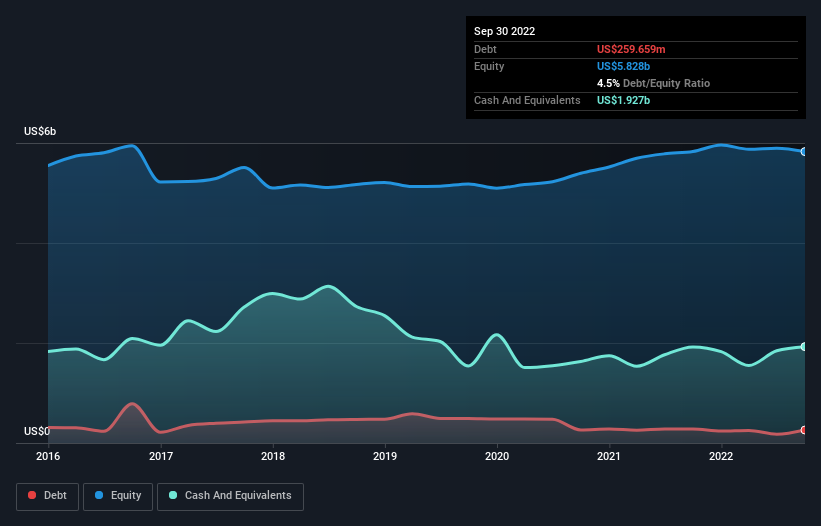
Some say volatility, rather than debt, is the best way to think about risk as an investor, but Warren Buffett famously said that 'Volatility is far from synonymous with risk.' When we think about how risky a company is, we always like to look at its use of debt, since debt overload can lead to ruin. Importantly, First Solar, Inc. (NASDAQ:FSLR) does carry debt. But is this debt a concern to shareholders?
Why Does Debt Bring Risk?
Debt is a tool to help businesses grow, but if a business is incapable of paying off its lenders, then it exists at their mercy. In the worst case scenario, a company can go bankrupt if it cannot pay its creditors. However, a more frequent (but still costly) occurrence is where a company must issue shares at bargain-basement prices, permanently diluting shareholders, just to shore up its balance sheet. By replacing dilution, though, debt can be an extremely good tool for businesses that need capital to invest in growth at high rates of return. When we think about a company's use of debt, we first look at cash and debt together.
View our latest analysis for First Solar
What Is First Solar's Debt?
The image below, which you can click on for greater detail, shows that First Solar had debt of US$259.7m at the end of September 2022, a reduction from US$279.2m over a year. However, it does have US$1.93b in cash offsetting this, leading to net cash of US$1.67b.

A Look At First Solar's Liabilities
We can see from the most recent balance sheet that First Solar had liabilities of US$816.3m falling due within a year, and liabilities of US$848.2m due beyond that. Offsetting this, it had US$1.93b in cash and US$360.6m in receivables that were due within 12 months. So it actually has US$623.3m more liquid assets than total liabilities.
This surplus suggests that First Solar has a conservative balance sheet, and could probably eliminate its debt without much difficulty. Simply put, the fact that First Solar has more cash than debt is arguably a good indication that it can manage its debt safely. There's no doubt that we learn most about debt from the balance sheet. But it is future earnings, more than anything, that will determine First Solar's ability to maintain a healthy balance sheet going forward. So if you want to see what the professionals think, you might find this free report on analyst profit forecasts to be interesting.
Over 12 months, First Solar made a loss at the EBIT level, and saw its revenue drop to US$2.5b, which is a fall of 3.8%. We would much prefer see growth.
So How Risky Is First Solar?
Although First Solar had an earnings before interest and tax (EBIT) loss over the last twelve months, it made a statutory profit of US$95m. So when you consider it has net cash, along with the statutory profit, the stock probably isn't as risky as it might seem, at least in the short term. We'll feel more comfortable with the stock once EBIT is positive, given the lacklustre revenue growth. The balance sheet is clearly the area to focus on when you are analysing debt. However, not all investment risk resides within the balance sheet - far from it. For example, we've discovered 3 warning signs for First Solar that you should be aware of before investing here.
Of course, if you're the type of investor who prefers buying stocks without the burden of debt, then don't hesitate to discover our exclusive list of net cash growth stocks, today.
New: AI Stock Screener & Alerts
Our new AI Stock Screener scans the market every day to uncover opportunities.
• Dividend Powerhouses (3%+ Yield)
• Undervalued Small Caps with Insider Buying
• High growth Tech and AI Companies
Or build your own from over 50 metrics.
Have feedback on this article? Concerned about the content? Get in touch with us directly. Alternatively, email editorial-team (at) simplywallst.com.
This article by Simply Wall St is general in nature. We provide commentary based on historical data and analyst forecasts only using an unbiased methodology and our articles are not intended to be financial advice. It does not constitute a recommendation to buy or sell any stock, and does not take account of your objectives, or your financial situation. We aim to bring you long-term focused analysis driven by fundamental data. Note that our analysis may not factor in the latest price-sensitive company announcements or qualitative material. Simply Wall St has no position in any stocks mentioned.
About NasdaqGS:FSLR
First Solar
A solar technology company, provides photovoltaic (PV) solar energy solutions in the United States, France, Japan, Chile, and internationally.
Very undervalued with flawless balance sheet.


